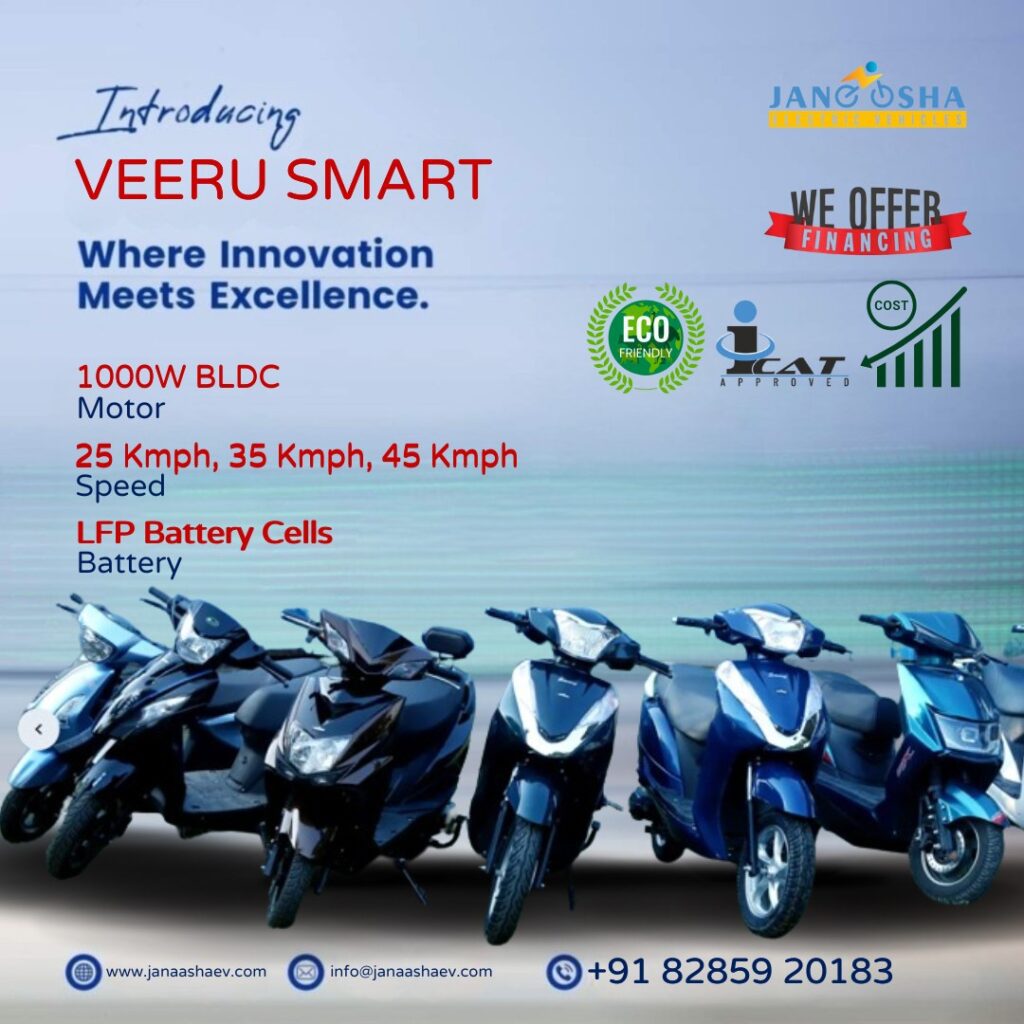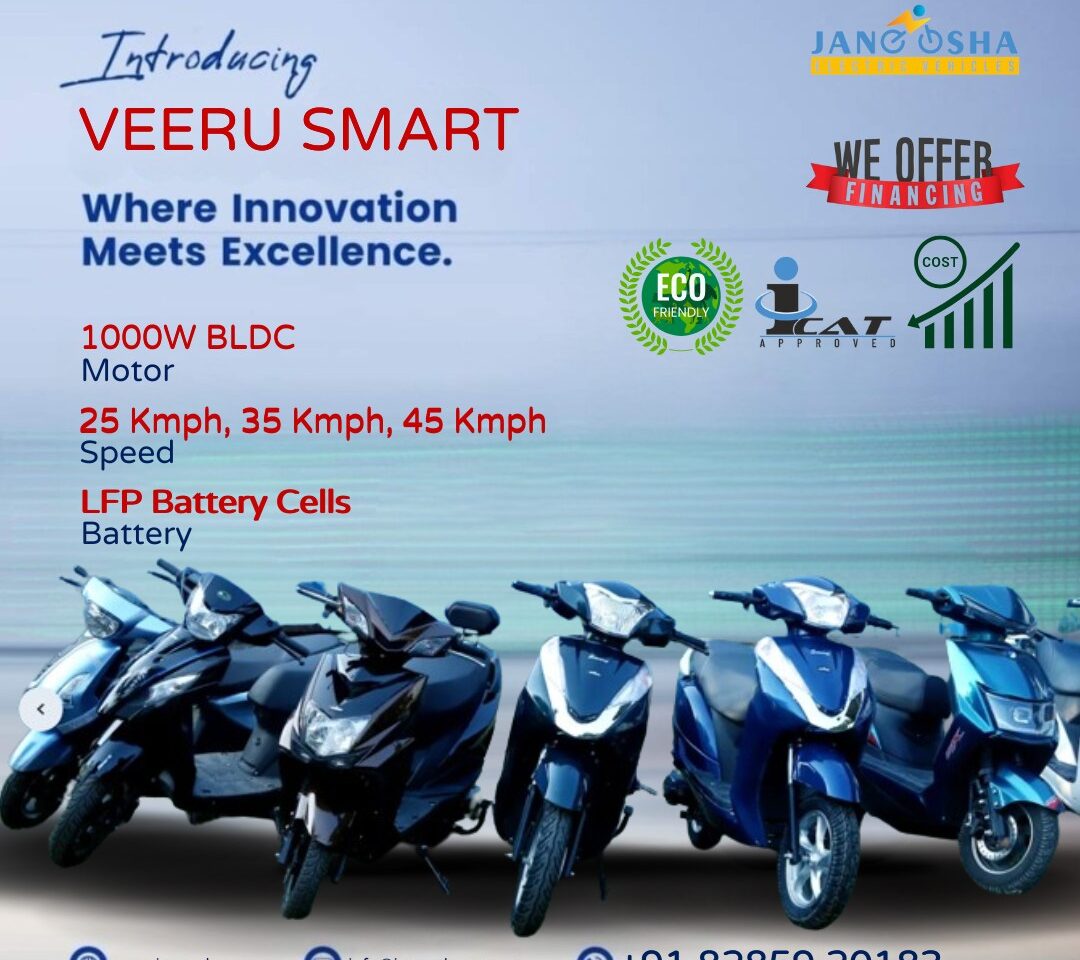The Future of Electric Vehicles in India

The automotive industry is undergoing a transformative shift driven by advancements in electric vehicle (EV) technology. As the world grapples with climate change and the need for sustainable transportation, India stands at a pivotal juncture in embracing electric mobility. The future of electric vehicles in India is promising, marked by government initiatives, technological innovations, and growing consumer awareness. Additionally, emerging companies like Janaasha Electric Vehicles are set to play a crucial role in this transition. This article explores the key factors shaping the EV landscape in India, the challenges, opportunities, and how Janaasha Electric Vehicles will contribute to this future.
Government Initiatives and Policies | Best Electric Vehicle Company In India
The Indian government has been proactive in promoting electric vehicles through various policies and initiatives aimed at reducing carbon emissions and dependence on fossil fuels. The Faster Adoption and Manufacturing of Hybrid and Electric Vehicles (FAME) scheme is a cornerstone of this effort. Launched in 2015, FAME provides financial incentives for EV buyers and supports the development of EV infrastructure. The second phase, FAME II, focuses on electrifying public transport and shared mobility, with a budget allocation of ₹10,000 crore.
Moreover, the government’s push for local manufacturing under the “Make in India” initiative is expected to boost the domestic EV industry. Policies like the Production-Linked Incentive (PLI) scheme for advanced chemistry cell (ACC) battery storage aim to reduce battery costs and encourage innovation. These measures are designed to make EVs more affordable and accessible to the average consumer, thereby accelerating their adoption.
Technological Advancements
Technological advancements play a crucial role in the future of electric vehicles in India. Battery technology, in particular, is a focal point. The development of lithium-ion batteries with higher energy densities and faster charging capabilities is reducing the cost and increasing the range of electric vehicles. Research into alternative battery technologies, such as solid-state batteries and metal-air batteries, holds the promise of even greater improvements in performance and safety.
Additionally, the integration of smart technologies and the Internet of Things (IoT) is transforming EVs into connected devices. Features like over-the-air updates, remote diagnostics, and advanced driver-assistance systems (ADAS) are enhancing the user experience and safety of electric vehicles. The development of robust charging infrastructure, including fast-charging stations and battery swapping networks, is also critical to supporting the widespread adoption of EVs.
Market Dynamics and Consumer Trends
The Indian EV market is witnessing rapid growth, driven by both supply and demand factors. Automakers are increasingly investing in electric mobility, launching new models across different segments. Major players like Tata Motors, Mahindra Electric, and MG Motor have already introduced successful electric cars, while global giants like Tesla and Hyundai are eyeing the Indian market with keen interest.
On the consumer side, there is a growing awareness of the environmental benefits and cost savings associated with electric vehicles. As fuel prices continue to rise and urban pollution reaches alarming levels, more consumers are considering EVs as a viable alternative to conventional vehicles. The total cost of ownership (TCO) of electric vehicles is becoming more attractive due to lower operating and maintenance costs compared to internal combustion engine (ICE) vehicles.
Challenges to Overcome | Best Electric Vehicle Company In India
Despite the positive outlook, the future of electric vehicles in India is not without challenges. The high initial cost of EVs, largely due to expensive battery components, remains a significant barrier to mass adoption. While government incentives and falling battery prices are helping, achieving price parity with ICE vehicles will take time.
Another major challenge is the lack of comprehensive charging infrastructure. Although efforts are underway to expand the network of charging stations, the current coverage is insufficient, particularly in rural areas. Range anxiety, or the fear of running out of battery power without access to a charging point, is a common concern among potential EV buyers.
Additionally, the Indian power grid’s ability to handle the increased load from widespread EV adoption is a critical issue. Ensuring a stable and reliable electricity supply, particularly from renewable sources, is essential for the sustainable growth of the EV sector.
Janaasha Electric Vehicles: A Catalyst for Change
Emerging companies like Janaasha Electric Vehicles are poised to play a significant role in shaping the future of electric mobility in India. Janaasha’s innovative approach to EV manufacturing and commitment to sustainability align well with the country’s goals.
Affordable and Efficient EVs
Janaasha focuses on producing affordable electric vehicles without compromising on quality and performance. By leveraging advanced manufacturing techniques and economies of scale, the company aims to reduce production costs and make EVs accessible to a broader segment of the population. This approach is crucial in addressing the high initial cost barrier that currently deters many potential buyers.
Battery Technology and Charging Infrastructure
Janaasha is investing heavily in cutting-edge battery technology to enhance the range and lifespan of its electric vehicles. Collaborating with research institutions and technology partners, the company is working on developing next-generation batteries that offer higher energy densities and faster charging times.
In addition, Janaasha is committed to expanding the charging infrastructure in India. The company plans to establish a network of fast-charging stations across major cities and highways, ensuring that EV users have convenient access to charging points. By partnering with local governments and businesses, Janaasha aims to alleviate range anxiety and promote the seamless adoption of electric vehicles.
Sustainability and Local Manufacturing
Janaasha’s commitment to sustainability extends beyond the vehicles themselves. The company is dedicated to sustainable manufacturing practices, using eco-friendly materials and minimizing waste. By setting up manufacturing plants in India, Janaasha supports the “Make in India” initiative and contributes to job creation and economic growth.
Public Awareness and Education | Best Electric Vehicle Company In India
Recognizing the importance of consumer awareness, Janaasha is actively involved in educating the public about the benefits of electric vehicles. Through campaigns, workshops, and collaborations with educational institutions, the company aims to dispel myths and provide accurate information about EV technology, cost savings, and environmental impact.
Opportunities and the Road Ahead
The future of electric vehicles in India is ripe with opportunities. One significant area is the localization of the EV supply chain. By promoting the domestic production of batteries, electric motors, and other key components, India can reduce its dependence on imports and create jobs in the emerging green economy. The government’s focus on skill development and research and development (R&D) in the EV sector is crucial in this regard.
Moreover, the integration of renewable energy sources with EV charging infrastructure presents a unique opportunity to create a sustainable energy ecosystem. Solar-powered charging stations, for instance, can reduce the carbon footprint of electric vehicles and support the transition to a cleaner energy grid.
The shared mobility sector also stands to benefit from the EV revolution. Electric two-wheelers and three-wheelers are gaining popularity for last-mile connectivity and urban commuting, driven by lower operational costs and government incentives. This segment has the potential to significantly reduce urban congestion and pollution.
Conclusion
The future of electric vehicles in India is bright, characterized by a confluence of supportive government policies, technological advancements, and evolving market dynamics. While challenges remain, the collective efforts of policymakers, industry stakeholders, and consumers can pave the way for a sustainable and electric mobility future. Companies like Janaasha Electric Vehicles are set to be at the forefront of this transformation, driving innovation, affordability, and sustainability. Janaasha’s focus on affordable EVs, advanced battery technology, extensive charging infrastructure, sustainable practices, and public education initiatives will be instrumental in accelerating the adoption of electric vehicles in India. As India accelerates its journey towards electric vehicles, it has the potential to emerge as a global leader in the green transportation revolution, setting an example for other nations to follow.
#best electric scooter in arunachal pradesh#best electric scooter in dadra and nagar haveli#best electric scooter in tripura#ventura electric scooter#icat electric scooter#vikrant e rickshaw#icat approved e scooter list#Best electric vehicle company in India#vespa scooter price in lucknow#e future electric scooter#removable battery scooters in india#evolution of electric vehicles in india#best electric scooter in jammu and kashmir#best ev manufacturing company in lucknow



